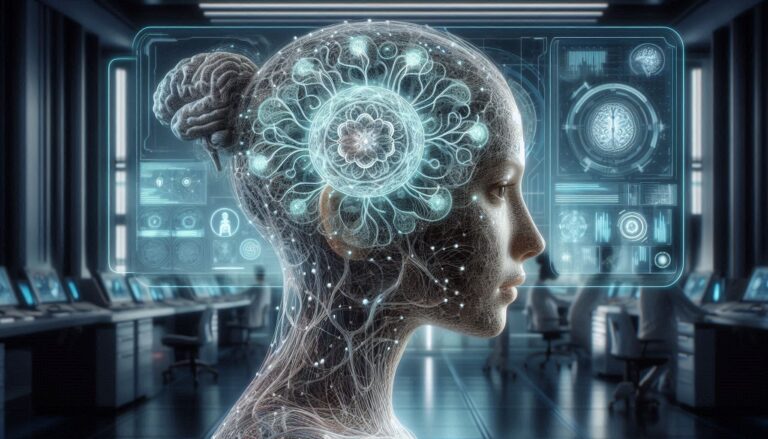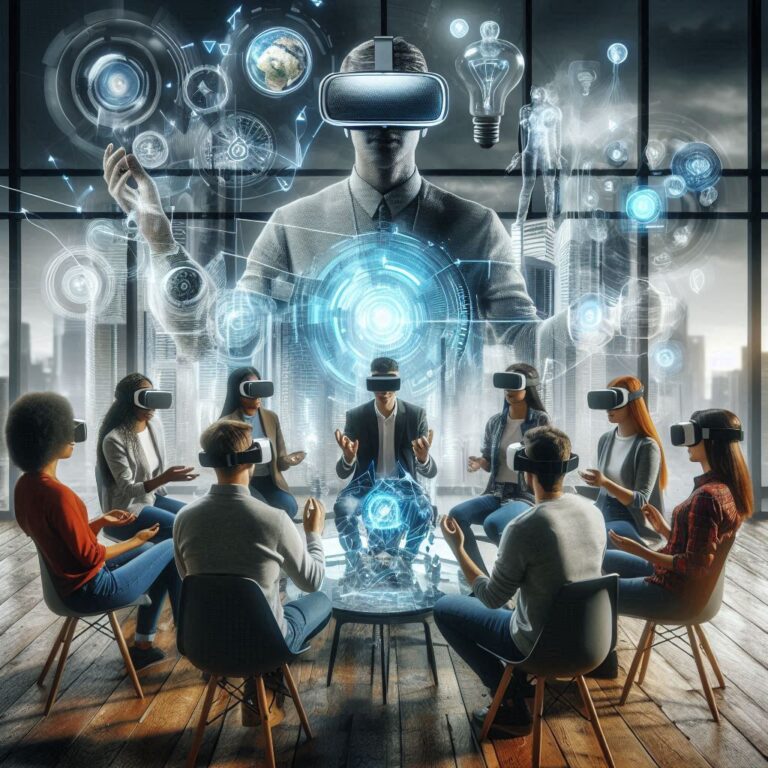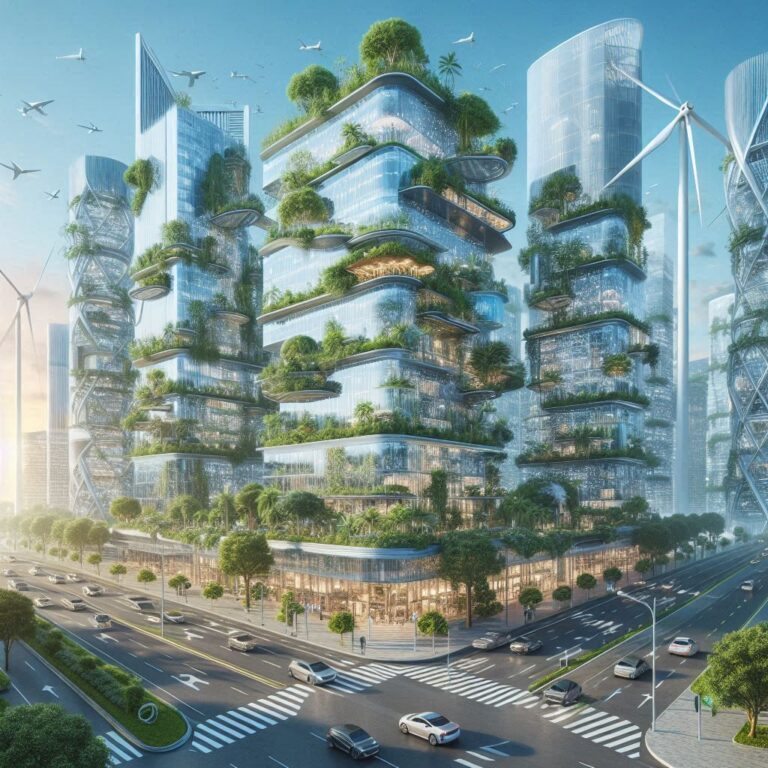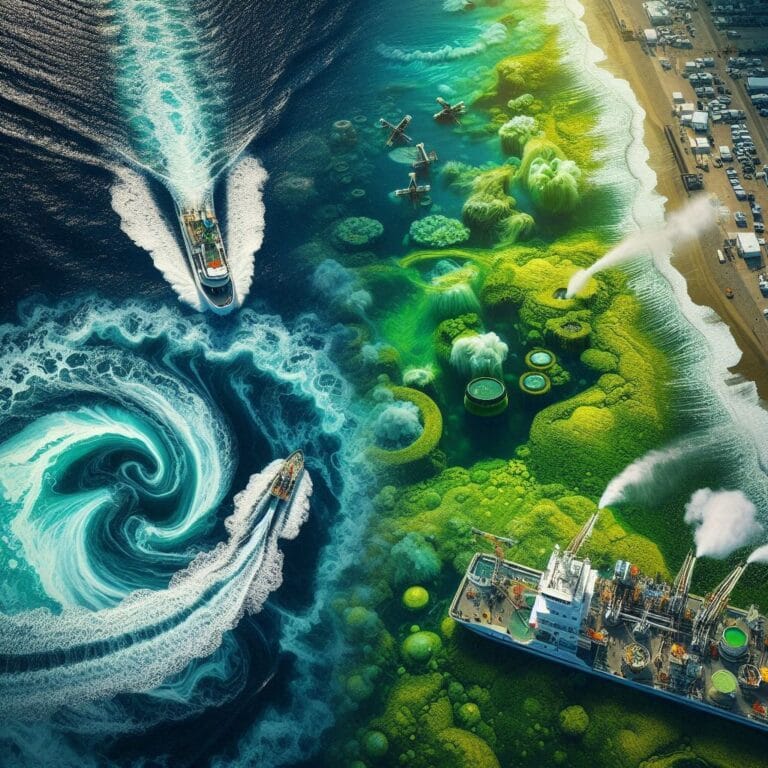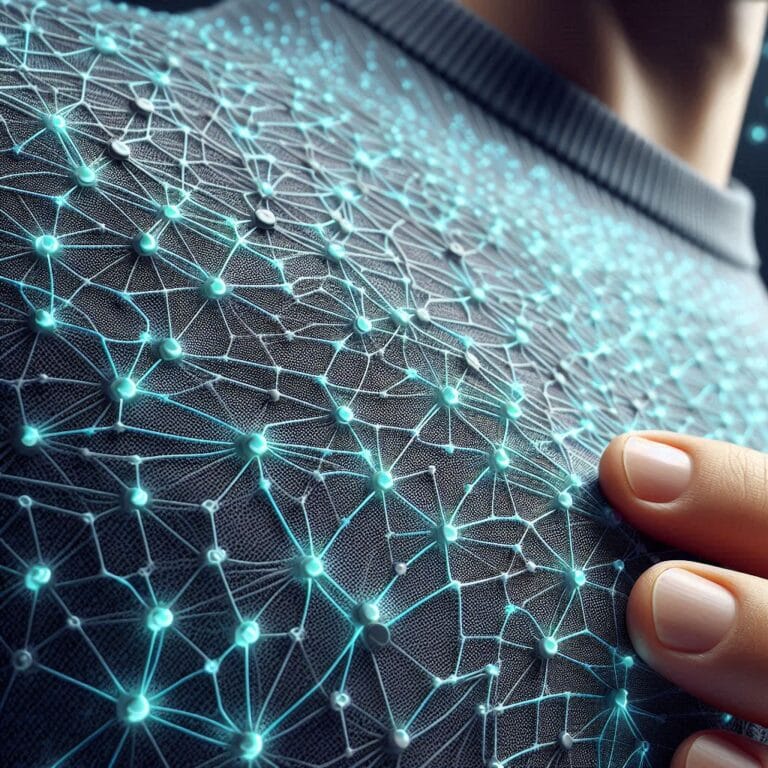Introduction: Amazing Future technology 2050 Shaping Tomorrow’s World
🌍 The Dawn of a New Technological Epoch
We are entering an age where innovation is accelerating at a pace humanity has never witnessed before. From neural interfaces to AI-driven art, we’re seeing glimpses of a world once confined to sci-fi movies. As we project ahead, future technology 2050 isn’t just about gadgets—it’s about redefining life itself.
By 2050, what we now consider amazing future technology could be as common as smartphones are today. The convergence of AI creativity, robotics, biotechnology, quantum computing, CRISPR and space tech will deeply alter how we live, work, think, and even feel.
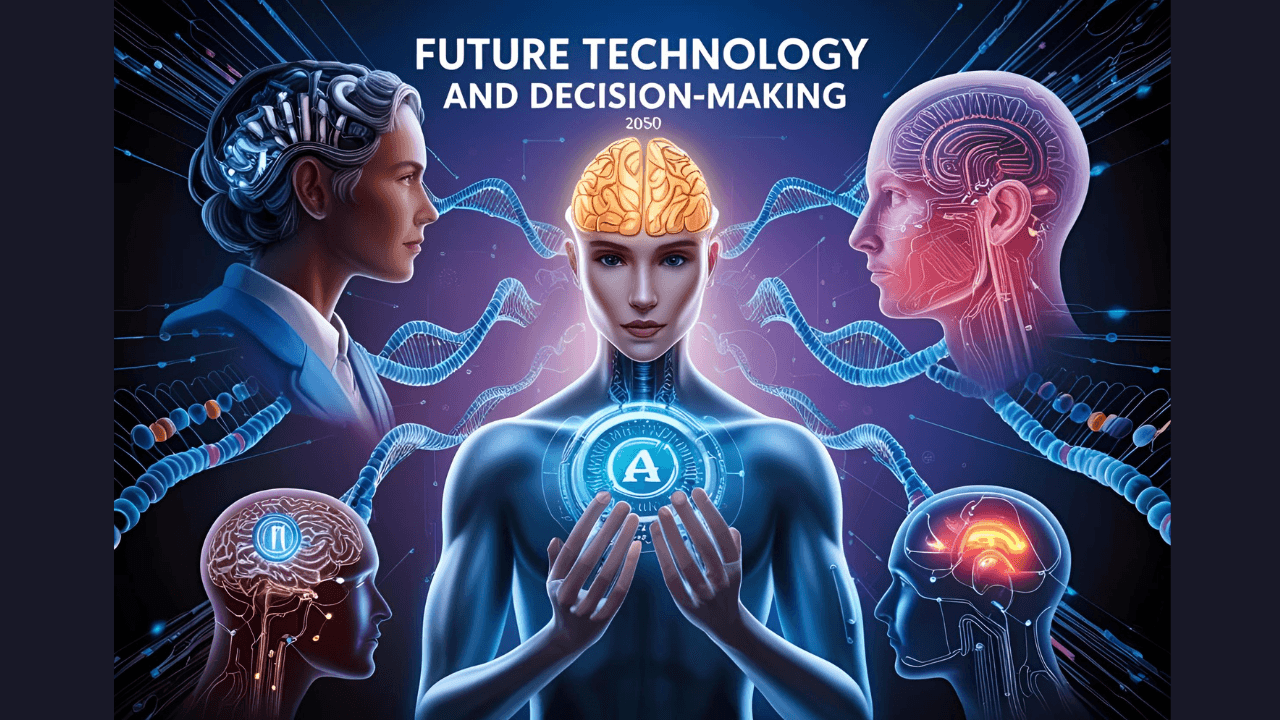
🔬 The Building Blocks of Tomorrow
The seeds of transformation are already here:
- AI creativity and decision-making.
- CRISPR is allowing scientists to rewrite DNA.
- Quantum computers are challenging the limits of classical logic.
- Brain-computer interfaces are bridging thoughts with machines.
Each of these innovations holds the potential to unlock extraordinary benefits—disease eradication, climate control, or human-level AI—but also raises profound ethical, emotional, and social questions.
⚖️ The Double-Edged Sword of Innovation
The era of future tech 2050 will not be without its dilemmas. Will AI enhance human potential or replace it? Will genetic engineering create a superhuman class, or will it reinforce inequality? Will digital surveillance offer safety or strip away privacy?
In this article, we will dive into the most amazing future technology 2050 could offer, blending existing tech with speculative but realistic scenarios. Our journey will explore both promise and peril—so buckle up for a ride through humanity’s most transformative century yet.
The Quantum Leap: Beyond Classical Computing
⚛️ The Present: Laying the Groundwork for Quantum Supremacy
Quantum computing is redefining the limits of traditional computing. Back in 2019, Google’s 53-qubit processor made headlines by completing a task in mere minutes—one that would take today’s most powerful supercomputers millennia to finish. Since then, progress has surged, with nations and tech giants investing billions into quantum research.
Today’s quantum prototypes are being tested for advanced encryption, molecular simulation, and high-efficiency logistics—all signs of the computing evolution that will define future tech 2050.
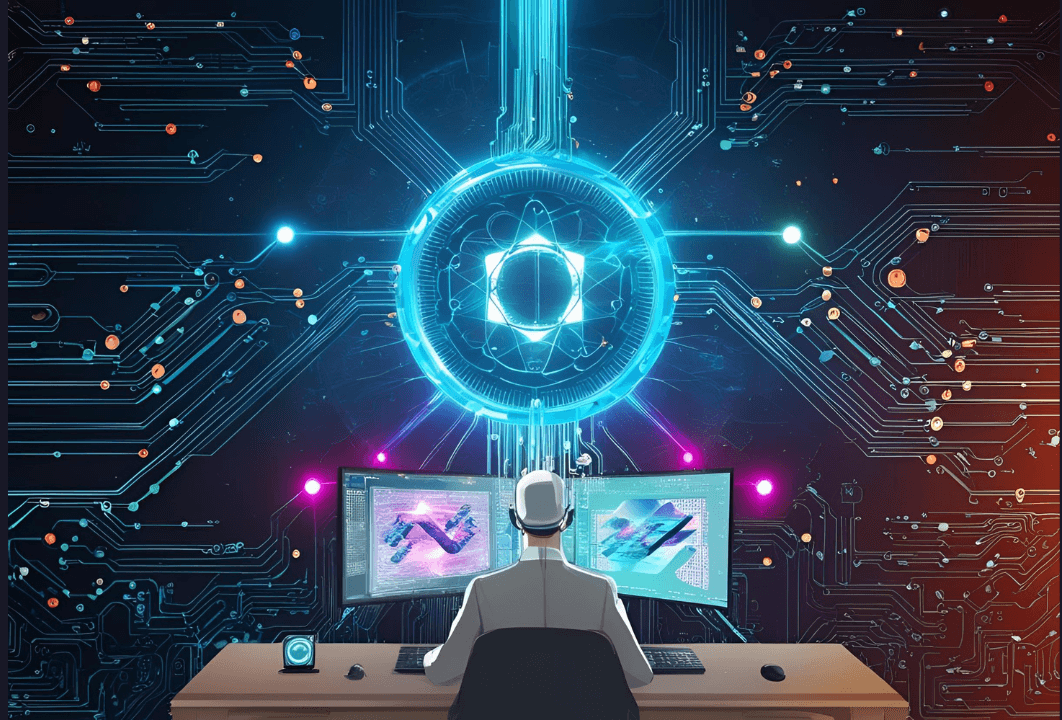
🚀 The Future: Quantum Computing in 2050
By 2050, quantum computing could become as integral to society as smartphones and cloud storage are today. Here’s what might become possible:
- Curing Diseases: Quantum simulations of proteins and drug interactions could lead to instant vaccine creation or tailor-made cures for cancer.
- Climate Control: Real-time global climate modeling could help governments prevent or even reverse ecological collapse.
- Theoretical Physics: Simulating alternate universes or dimensions could help decode the mysteries of space-time and consciousness.
The leap from bits to qubits will enable calculations at speeds unimaginable today. This shift will make quantum computing 2050 one of the most pivotal innovations of the century.
⚠️ The Risks: Quantum Threats and Cyber Dominance
However, the rise of quantum tech isn’t all positive. If in the wrong hands, it could:
- Break current encryption, exposing banks, governments, and personal data.
- Create cyber weapons that can’t be countered by today’s security protocols.
- Lead to quantum monopolies, where only the elite control knowledge and power.
Without ethical frameworks, future tech 2050 could shift from enlightenment to control. The very tools that promise to liberate us might also enslave us in systems we don’t fully understand.
The Era of Intelligent Machines: AI Creativity
🎨 Where We Are Now: The Rise of Functional AI
Artificial Intelligence has already disrupted countless industries. From OpenAI’s GPT-4 generating text and poetry to DALL·E and Midjourney creating hyperrealistic artwork, AI is not just automating tasks—it’s entering the realm of human creativity. These systems mimic human behavior, learn from patterns, and improve with data, pushing the limits of what machines can do.
🔮 The Future in 2050: Machines as Creative Geniuses?
By 2050, artificial intelligence could evolve beyond mimicking creativity—it might embody it. Imagine AI in 2050 crafting bestselling books, creating art that tugs at the heart, designing visionary architecture, and composing music that moves the soul—all without a single human touch. This isn’t a distant fantasy; the seeds of AI creativity are already being sown today.
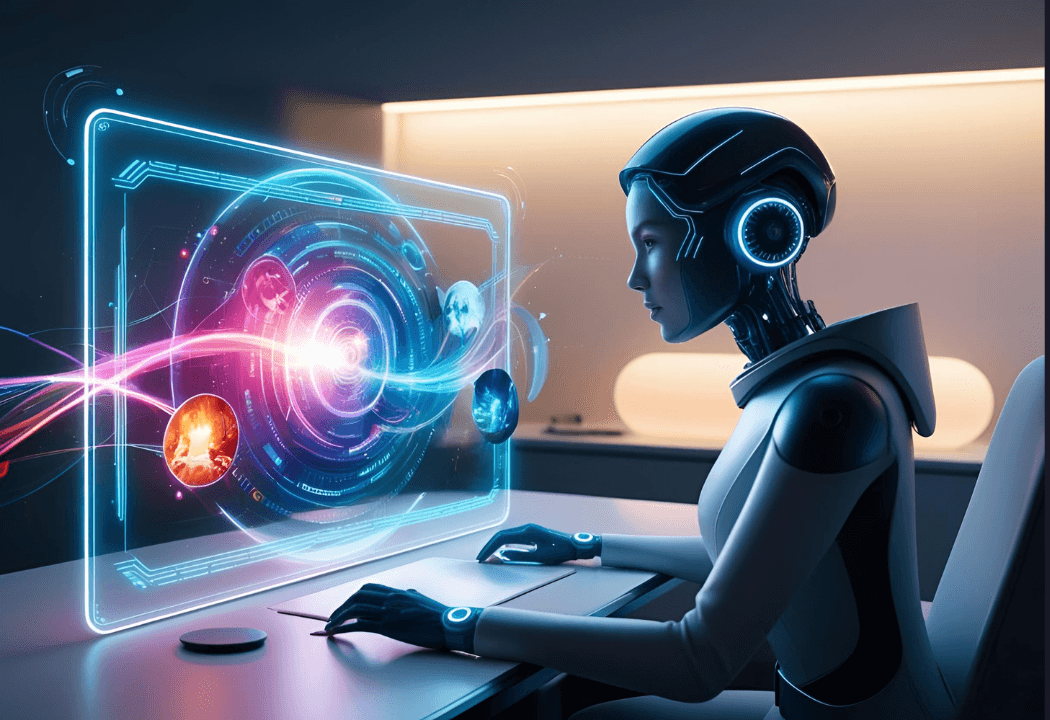
Imagine:
- AI philosophers challenging our perceptions of reality.
- Virtual artists whose fanbases rival real-world creators.
- AI filmmakers producing blockbuster hits in seconds.
Artificial intelligence 2050 might not only understand emotions—it may invent entirely new forms of expression.
⚠️ The Dark Side: The Death of Human Creativity?
As machines master creativity, society faces a profound cultural dilemma. If AI creativity dominates music, art, writing, and design:
- Will human artists become obsolete?
- Will we experience a creativity crisis—a world flooded with technically perfect but emotionally hollow content?
- Could we lose the unpredictability, imperfection, and raw emotional depth that define human expression?
In a world powered by intelligent machines, the question won’t be can AI create?, but should AI replace human creators? The cultural stakes are just as high as the technological ones.
Health and Longevity: Biohacking and Synthetic Bodies
🧬 Where We Are Now: The Age of Precision Medicine
Modern medicine is undergoing a quiet revolution. With CRISPR enabling gene editing, wearable devices monitoring our vitals in real-time, and synthetic biology creating lab-grown organs, we’re already redefining human health. Biohackers and longevity enthusiasts are experimenting with DIY implants, nootropics, and cellular regeneration.
These trends lay the groundwork for a biohacking Future tech 2050 where biology and technology are seamlessly merged.
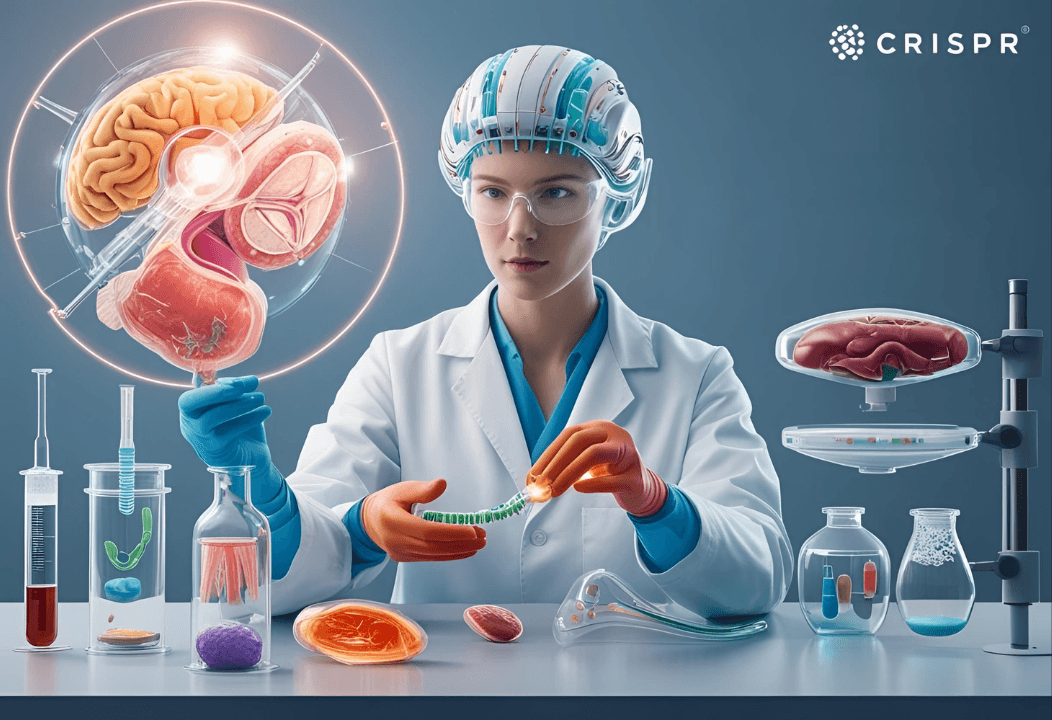
🦾 Envisioning 2050: The Rise of the Augmented Human
By mid-century, humanity could be redefined—not by biology alone, but by the integration of advanced technology into our very bodies and minds. Picture this:
- Bionic limbs that outperform the natural human form in speed, dexterity, and strength.
- Tiny nanobots patrolling your bloodstream, repairing cells and preventing illness in real time.
- Genetic blueprints edited at birth, eliminating inherited diseases and enhancing cognitive or physical capabilities.
- Minds linked to the cloud, instantly downloading knowledge, or even communicating thought-to-thought via neural implants.
As we cross the threshold between biology and machine, the idea of “being human” may evolve into something altogether new—where aging is optional, memory is expandable, and physical limits are merely design choices.
🧨 The Ethical Divide: Utopia or Inequality?
But there’s a dark side. These breakthroughs will come at a cost—quite literally. What happens when only the wealthy can afford superhuman enhancements?
- Could we see a genetic divide, where enhanced humans dominate unenhanced populations?
- Will biohacking 2050 become a status symbol, deepening inequality?
- What are the risks of corporate or government control over the human genome?
The line between therapy and enhancement will blur, raising ethical dilemmas about access, autonomy, and the future of human identity.
The Digital Metaverse: Virtual Realities or Escaped Realities?
🕶 Present Day: The Rise of Virtual Worlds
The metaverse is no longer a sci-fi fantasy—it’s unfolding in real time. With Meta, Apple Vision Pro, and platforms like Roblox or Decentraland, we’re already dipping into persistent, interactive digital spaces. Headsets, haptic gloves, and even smell simulators are offering glimpses of immersive experiences—but we’re only scratching the surface.
This growing virtual reality future promises more than entertainment—it offers a new social, economic, and even spiritual dimension.
🧠Future tech 2050: When Digital Becomes Indistinguishable from Real
By 2050, the metaverse may be as real and tangible as the physical world. Full-body suits, brain-computer interfaces, and quantum-powered servers could allow:
- Photorealistic virtual worlds that mirror or surpass physical environments.
- Persistent digital identities—avatars with memories, emotions, and personalities.
- Virtual economies where jobs, property, and education exist entirely online.
- Digital immortality through memory preservation and consciousness uploads.
Metaverse 2050 could offer limitless creativity, global collaboration, and freedom from physical constraints. Want to attend a concert on Mars? Explore a recreated 18th-century Paris? Live forever in a virtual utopia? All could be possible.
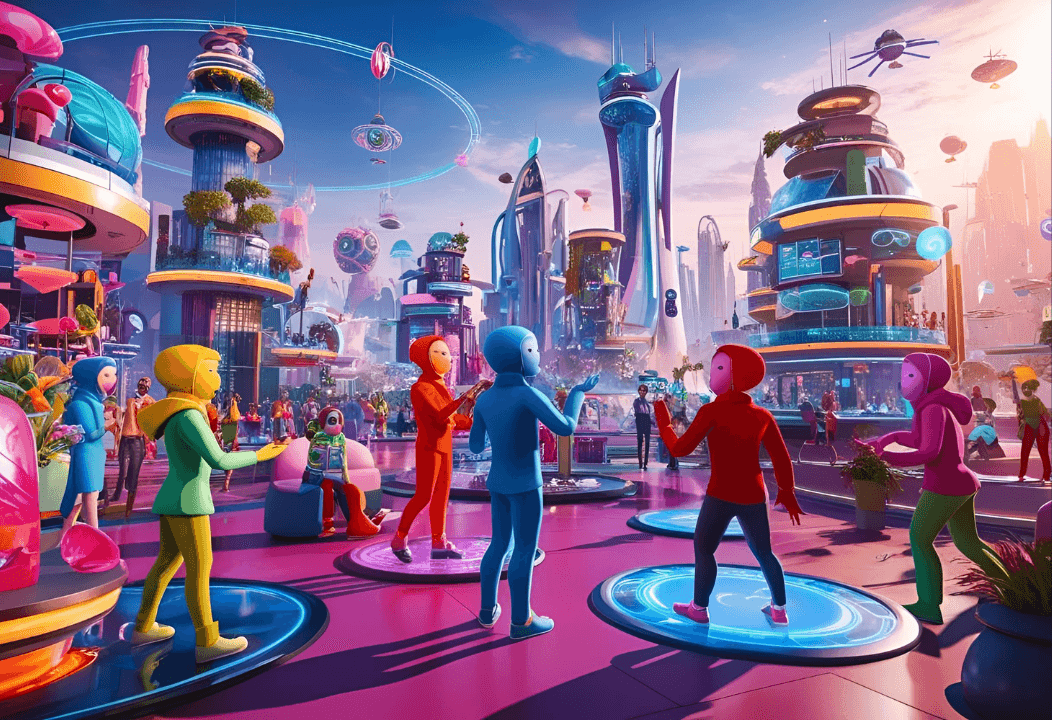
⚠️ The Flip Side: Escaping Too Much Reality?
Yet as immersive experiences become more compelling, the risk of detachment grows.
- Mental health concerns may rise as people escape real-world stress into hyper-curated digital lives.
- Human connection might weaken, replaced by AI-driven relationships or synthetic companionship.
- Economic inequalities could deepen, with only a tech-savvy elite accessing premium virtual services.
- Could we see an era of “digital homelessness”, where those unplugged are left behind socially and economically?
The virtual reality future promises wonder—but also poses the existential question: Will we still value the real if the virtual becomes perfect?
AI-Driven Social Systems: Machines Shaping Human Lives
🤖 Present Trends: AI Already Makes Decisions
AI is already influencing modern society through:
- Predictive policing to anticipate crimes.
- Algorithmic justice systems assessing sentencing risks.
- Smart cities optimizing energy, traffic, and services.
- Targeted political campaigns and psychological profiling.
As AI governance slowly embeds into civic infrastructure, we’re seeing the early mechanics of machine-mediated society.
🧬 Amazing future technology 2050: Automated Governance and Algorithmic Leadership
By 2050, AI decision-making could be central to every facet of governance and personal life:
- AI-led political systems, where unbiased algorithms set economic policy, resource allocation, and public service distribution.
- Real-time justice systems that analyze evidence and issue verdicts instantly.
- Personalized tax, education, and healthcare plans, dynamically optimized by neural networks.
- Emotionally aware AI assistants making ethical decisions on your behalf.
The future society could be hyper-efficient, fairer in theory, and free from corruption—but at what cost?
⚠️ The Dangers: Loss of Autonomy and Algorithmic Oppression
The dark side of AI governance raises chilling questions:
- Will we lose moral agency, relying on data over human judgment?
- Who programs the AI? And who ensures transparency in its logic?
- Could oppressive regimes weaponize AI to control, censor, or socially engineer populations?
- Might “benevolent AI dictators” emerge, where liberty is sacrificed for stability?
In AI decision-making 2050, efficiency may clash with humanity. And in the battle between logic and compassion—which will define our laws, lives, and liberties?
Genetic Engineering and Designer Humans: CRISPR-Cas9
🧬 Present Day: Editing the Code of Life
The genetic editing future is already unfolding. Technologies like CRISPR-Cas9 have enabled scientists to cut and replace faulty genes, offering hope for curing inherited diseases like sickle cell anemia or cystic fibrosis. Researchers are exploring embryo editing, gene drives for eradicating pests, and even synthetic biology to create organisms from scratch.
We are rewriting the DNA of life itself—and we’ve only just begun.
🌐 2050 Vision: Designer Humans and Synthetic Biology
By 2050, CRISPR-like technology may evolve into precision tools that allow:
- Custom-designed embryos with pre-selected traits—IQ, appearance, emotional stability.
- Synthetic humans enhanced for productivity, resilience, or even resistance to disease and aging.
- Gene upgrades for adults, offering postnatal genetic enhancements or emotional tuning.
The future might see a world where “natural birth” becomes rare, replaced by genetic optimization for every individual. Imagine a society where your genetic code is your résumé—engineered for success.
⚠️ Ethical Dilemmas: The Death of Diversity?
With such power, the risks loom large:
- Genetic inequality could rise, where only the wealthy can afford enhancements, creating a “bio-elite” class.
- Cultural and biological homogenization may occur as societies gravitate toward a narrow definition of perfection.
- Ethical confusion: What’s an enhancement versus an unfair advantage? Who decides what’s “better”?
In chasing perfection, will we lose the messy, unpredictable, beautifully diverse nature of humanity? The future of synthetic humans may force us to redefine what it means to be human at all.
Space Colonization: Humanity’s Journey Beyond Earth
🚀 Present Momentum: Rocketing Toward the Stars
Space exploration is no longer exclusive to government agencies. Private giants like SpaceX, Blue Origin, and NASA’s Artemis program are building the infrastructure for regular off-Earth missions. Reusable rockets, lunar bases, and even space tourism are now part of active development.
The journey into space technology started decades ago, but the pace of innovation is rapidly picking up as we approach 2050.
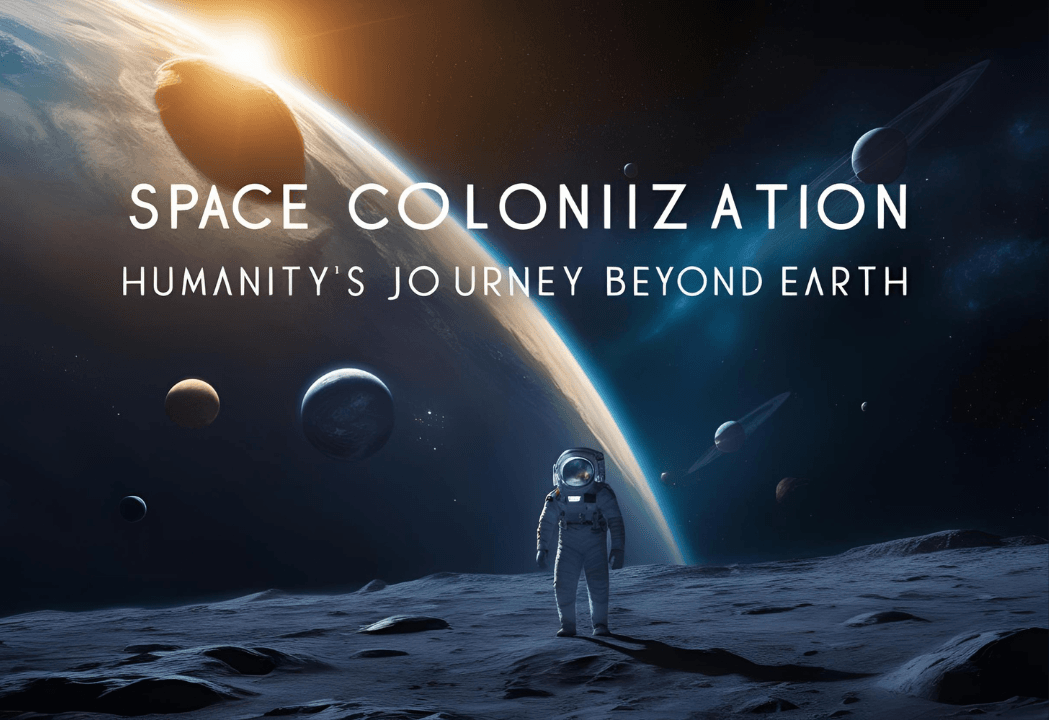
🌌 2050 Vision: Living Beyond Earth
By 2050, space may no longer be a frontier—it could be home. Possibilities include:
- Self-sustaining Mars colonies, complete with greenhouses, oxygen systems, and terraforming experiments.
- 3D-printed lunar bases, manufacturing hubs orbiting Earth for zero-gravity industries.
- Asteroid mining operations could unlock trillions in valuable minerals, fueling both Earth’s economy and the growing demands of space colonies.
- Interplanetary education and citizenship, as people are born and raised on other celestial bodies.
The space colonization future could make humanity a multi-planetary species, offering hope against overpopulation, climate disasters, or global wars.
⚠️ The Dark Side: Who Gets to Leave Earth?
With great distance comes great disparity:
- Space elitism may emerge, with only the ultra-wealthy able to escape Earth’s problems.
- Environmental damage from space mining, debris, and unregulated off-world activities could affect both planets.
- Cultural erasure: Will Earth traditions, languages, and ecosystems survive the transition to other planets?
The future of space exploration isn’t just about survival—it’s about responsibility. Are we escaping Earth to save it—or abandoning it altogether?
Autonomous Vehicles and the Death of Traffic
🚗 Present Momentum: From Assists to Autonomy
Autonomous vehicles are no longer sci-fi—they’re on our streets. Companies like Tesla, Waymo, and Cruise are testing self-driving cars with Level 4 automation, capable of handling most road situations without human intervention. AI-powered sensors, LiDAR, and real-time data processing are revolutionizing the future of transport, promising fewer accidents and better efficiency.
In 2024, autonomous delivery vehicles and robo-taxis are already rolling out in pilot zones.
🌐 2050 Vision: Cities Without Drivers or Traffic
By 2050, autonomous driving may reach full maturity:
- Traffic lights and congestion could be relics of the past as AI coordinates millions of vehicles in perfect synchronization.
- Zero-accident roads, with machine precision reacting faster than human reflexes.
- Urban redesign to eliminate parking lots, reduce emissions, and open up pedestrian-friendly megacities.
- Mobility on demand, where people summon driverless pods that take them anywhere—no more car ownership.
Autonomous vehicles could redefine freedom, turning transit time into leisure, work, or rest.
⚠️ The Price of Progress: What We May Lose
However, full automation could have significant ripple effects:
- Mass unemployment across industries like trucking, taxis, delivery, and public transport.
- Erosion of human skills as driving becomes a lost art.
- Ethical dilemmas—in situations requiring split-second decisions, who programs the AI’s morality?
- Hacking threats: Could rogue actors disable fleets of driverless cars?
The future of transport promises freedom—but also forces us to rethink labor, ethics, and control on a societal scale.
FAQ
What technologies are expected to dominate the world by 2050?
By 2050, experts anticipate breakthroughs in artificial intelligence, quantum computing, fusion energy, space colonization, genetic engineering, and brain–computer interfaces. These technologies could fundamentally reshape human civilization, economies, and even our biology.
How could artificial intelligence impact daily life by 2050?
AI is likely to evolve into artificial general intelligence (AGI), capable of reasoning, creativity, and decision-making at human or superhuman levels. This could lead to automated industries, personalized education, AI-driven governments, but also raise risks of job displacement and loss of human control.
Will humans live longer by 2050 thanks to technology?
Advances in biotechnology, nanomedicine, and genetic editing (like CRISPR) may extend human lifespans significantly. By 2050, humans could live 120–150 years on average, though this may widen the gap between wealthy nations and developing regions due to unequal access.
What are the dangers of future military technologies?
By 2050, warfare could involve autonomous AI weapons, space-based defense systems, cyber warfare, and bioengineered viruses. The major danger is the loss of human oversight, where machines make life-or-death decisions, raising ethical and existential risks.
Could space colonization be a reality by 2050?
Yes. With rapid progress in rocketry, space mining, and closed-loop life support systems, humans may establish permanent bases on the Moon and Mars. However, challenges include radiation exposure, psychological effects of isolation, and sustainable food production in space.
How might climate change technologies reshape the planet by 2050?
Future solutions like fusion power, geoengineering, carbon capture megaprojects, and AI-managed ecosystems could help stabilize the climate. But if misused, technologies such as geoengineering may trigger unintended weather disruptions or political conflicts over global climate control.
What ethical dilemmas could arise with 2050 technologies?
Breakthroughs in AI, genetics, and human augmentation will spark debates about what it means to be human. Ethical dilemmas may include: Should we allow designer babies? Should AI have rights? Who controls life-extending technologies? These questions will determine whether 2050 is a utopia or dystopia.
Conclusion: A Future Full of Promise—But Not Without Dangers
🚀 Looking Ahead: The Next Frontier of Human Imagination
As we march toward 2050, the world is being reshaped by incredible innovation—future technologies 2050 like quantum computing, CRISPR-Cas9, AI Creativity, and space colonization are pushing us into a reality we once only dreamed of.
From eradicating diseases to building cities on Mars, the potential is almost limitless. The future technology 2050 horizon brings promises of longer life, smarter societies, and boundless opportunities for creativity and connection.
⚖️ Dual Realities: Progress Meets Paradox
Yet every leap forward carries shadows:
- Ethical challenges from designer humans to AI governance.
- Social rifts from tech inequality to job displacement.
- Mental and emotional risks from immersive metaverses to AI emotional manipulation.
This future is not pre-written—it’s being coded, engineered, and designed right now. The future possibilities we imagine today will become our everyday lives tomorrow.
🧠 Final Thought: Will We Master the Future—or Be Mastered by It?
The real question isn’t whether technology will transform the world—it’s whether we’ll adapt to it wisely. Will our innovations elevate humanity, or will they leave us in the dust?
The choice is still ours. But time is ticking.
🔍 Curious about the future of tech and science?
Don’t miss these fascinating reads:
Explore how each breakthrough is shaping the world of tomorrow.

